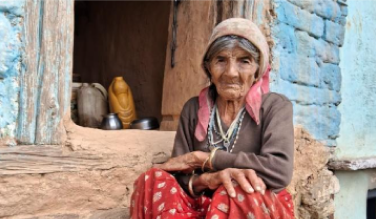
Radhuli Devi
In the serene village of Talli Kafali, nestled in the heart of the picturesque district of Almora, Uttarakhand, a remarkable success story quietly unfolded. This story is one of tenacity, community support, and the transformative power of dedicated organizations. At the center of this narrative stands a 73-year-old woman, Smt. Raghuli Devi, whose journey from adversity to empowerment serves as an inspiration to us all.
Radhuli Devi’s life had been one of struggle from the start. Born into poverty, she was unable to pursue education and remained illiterate. Her late husband’s passing left her to navigate life’s challenges alone. Her five daughters were married and lived in distant homes, save for one who was widowed at a young age; she visits occasionally to see her mother. Loneliness became her constant companion as she faced the twilight years of her life.
The turning point came with the arrival of CORD (Community Outreach for Rural Development), an organization committed to fostering holistic growth in rural communities. In 2017, CORD introduced itself to the community of Talli Kafali, and through their integrated rural development programs, they reached out to Raghuli Devi. Recognizing the power of collective strength, she joined the Chinmaya Kafali Mahila Mandal, a women’s forum initiated by CORD.
The Mahila Mandal became more than just a group for Raghuli Devi – it was a lifeline. Here, she found a safe space to share her struggles and a platform to voice her concerns. She spoke of the challenges she faced in securing her old age pension, a crucial lifeline that had been halted for several years. Despite her visits to various government offices, the solution remained elusive. This is where CORD stepped in, guiding her in drafting a petition and rallying support from the local Mahila Mandals. The petition, backed by the weight of community endorsement, was sent to relevant authorities, even reaching the office of the Chief Minister of Uttarakhand.
With unwavering determination, Raghuli Devi’s story gained momentum. The principles of transparency and accountability were harnessed as CORD invoked the Right to Information Act, 2005, to expedite the process. Their tireless efforts bore fruit as Raghuli Devi’s old age pension was reinstated. But the transformation didn’t stop there.
Empowerment radiated through various facets of Raghuli Devi’s life. CORD, recognizing the need for basic amenities, helped her construct a toilet, a symbol of dignity and hygiene. Beyond physical support, CORD nurtured her emotional well-being. Through the Mahila Mandal, Raghuli Devi experienced the warmth of community, replacing isolation with a sense of belonging.
Raghuli Devi’s journey was marked by her participation in CORD’s self-unfoldment activities. These activities not only enriched her soul but also brought peace and spiritual fulfillment to her life. As the Mahila Mandal meetings and the self-unfoldment activities converged, Raghuli Devi blossomed into a beacon of resilience.
In the tapestry of Raghuli Devi’s life, threads of struggle are interwoven with threads of support and transformation. Her story becomes a testament to the strength that a united community can provide, and the impact of organizations like CORD in channeling positive change.
